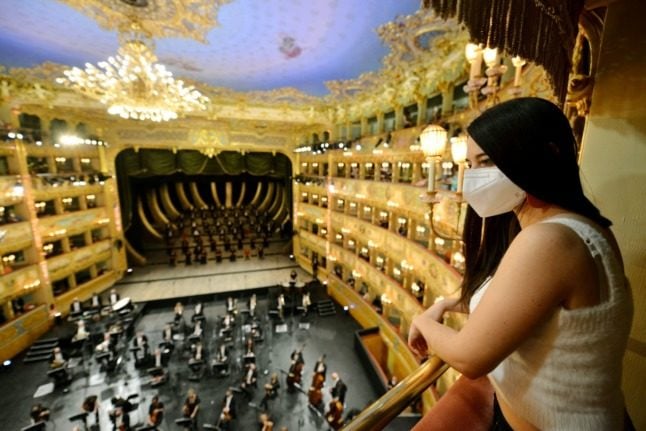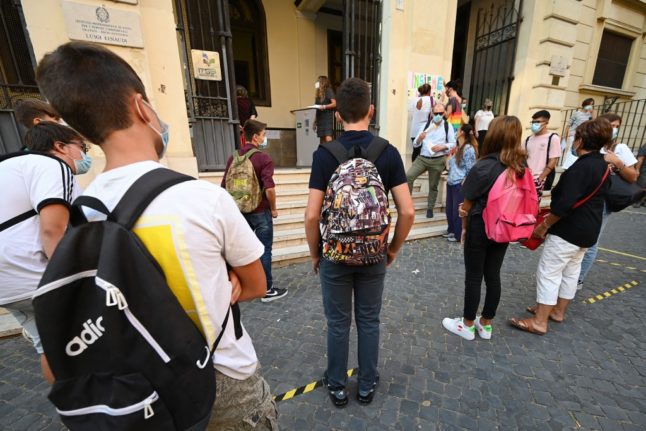A new decree relaxing and changing some of Italy’s coronavirus restrictions was signed into law on October 8th and came into force on Monday.
“Finally all culture begins to live again. From 11 October cinemas, theatres and concerts indoors and outdoors will return to 100% capacity, obviously with a mask and green pass,” Italy’s Minister of Culture Dario Franceschini tweeted on Thursday in anticipation of the new rules.
Finalmente tutta la #cultura ricomincia a vivere. Dall’11 ottobre #cinema #teatri e #concerti al chiuso e all’aperto tornano al 100% della capienza, ovviamente con mascherina e green pass. Negli stadi e nei palasport per la musica stesse regole dello sport. pic.twitter.com/IhkiyAJuij
— Dario Franceschini (@dariofrance) October 7, 2021
Previous decrees in recent weeks have tightened and updated the rules on using Italy’s health certificate or ‘green pass’; most notably a law passed on September 16th brought in the requirement for all workers across both the private and public sectors to show the pass to enter workplaces from October 15th.
The green pass shows that the holder has been vaccinated, has recovered from Covid-19 within the past six months, or has recently tested negative for the virus.
EXPLAINED: How Italy will enforce the new ‘green pass’ rules in all workplaces
The new decree, by contrast, provides for some existing restrictions to be relaxed from October 11th, with vaccination coverage now at 80 percent of the eligible population and with the tightened green pass rules in place.
The updated rules will apply only in parts of the country in the least restricted ‘white’ zone under Italy’s tiered Covid restriction system – currently the entire country after Sicily was returned from the more restricted ‘yellow’ zone on Saturday.
Here’s what changes according to the text of the new decree (you can find it here in Italian).
Increased capacity in theatres and cinemas
Previously, cinemas, theatres and concert halls could operate at 50% capacity indoors and 80% capacity outdoors, with all attendees required to produce a green pass and wear a mask.
As of Monday, shows open to the public in theatres, concert halls, cinemas, and entertainment and live music venues may operate at 100% capacity both indoors and outdoors.
Health certificate and masking requirements remain in place for all ticket holders.
Museums
Museums previously did not have restricted capacity, but were required to ensure social distancing of at least one metre between visitors.
That requirement is now scrapped, though as in all other cases, managers must ensure anyone who enters is wearing a mask and in possession of a green pass.
Bigger crowds allowed in sports stadiums
Outdoor sports stadiums, which previously could only operate at 50% capacity, are now allowed to fill up to 75% of seats.
Indoor stadiums, meanwhile, have had their operating capacity increased to 60%.
Existing masking and green pass requirements remain in place.
READ ALSO: Where do you now need to show a Covid green pass in Italy?
Discos to reopen
Discos, which have been closed for over a year, will be allowed to reopen at 75% capacity outdoors and 50% indoors – with indoor venues under the obligation to use ventilation systems which do not recirculate the same air.
Italy’s Scientific Technical Committee (CTS) which advises the government on health measures and whose suggestions are not binding, had previously given the green light for discos to reopen to the public at 35% capacity indoors and 50% outdoors.
However the proposal was dismissed by disco owners as financially unviable, with some trade associations threatening to take to the streets and various politicians deriding the suggested rules as a “joke”.
Green passes and masks are required, but customers may remove masks when dancing.
Sanctions
Those venues found to be in violation of the rules on two separate days face being temporarily closed for anywhere between one and ten days.
Additional proposals to relax quarantine restrictions on schoolchildren
While this is not included in the new decree, it’s expected that in the coming weeks quarantine requirements will be relaxed for schoolchildren whose classmates have tested positive for the coronavirus.
On Friday Italy’s regional health authorities convened to discuss a path forward to lowering the restrictions, with the aim being to arrive at a national guideline, reports Il Sole 24 Ore.
It’s previously been proposed that only the deskmates of a child who test positive should be required to quarantine, with the rest of the class tested immediately and on day 5.
Scientists have also suggested that the quarantine period could be reduced from seven to five days for vaccinated students.



 Please whitelist us to continue reading.
Please whitelist us to continue reading.
Member comments